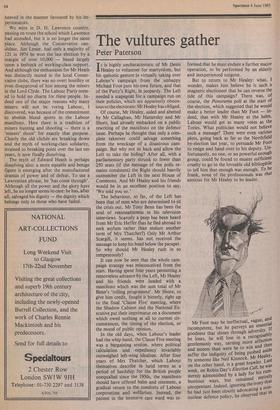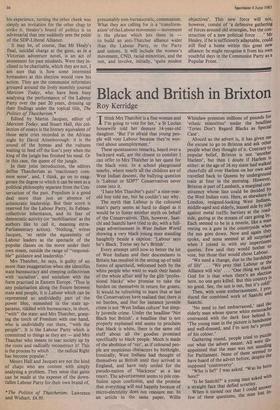The vultures gather
Peter Paterson
It is highly uncharacteristic of Mr Denis Healey to volunteer for martyrdom, but his quixotic gesture in virtually taking over Labour's campaign from the unhappy Michael Foot puts his own future, and that of the Party's Right, in jeopardy. The Left needed a scapegoat for a campaign run on their policies, which are apparently obnox- ious to the electorate: Mr Healey has obliged.
Of course, Mr Healey, aided and abetted by Mr Callaghan, Mr Hattersley and Mr Shore, had already embarked on a public rewriting of the manifesto on the defence issue. Perhaps he thought that only a com- plete takeover could salvage something from the wreckage of a disastrous cam- paign. But why not sit back and allow the Left to take the hiding? After all, with a parliamentary party shrunk to fewer than 250 seats (if the message of the polls re- mains consistent) the Right should heavily outnumber the Left in the next House of Commons. And Mr Healey and his friends would be in an excellent position to say, 'We told you so.'
The behaviour, so far, of the Left has been that of men who are determined to sit the crisis out. Mr Tony Benn has been the soul of reasonableness in his television interviews. Scarcely a peep has been heard from Mr Eric Heffer (has he fled abroad to seek asylum rather than endure another term of Mrs Thatcher?) Only Mr Arthur Scargill, it seems, has not received the message to keep his head below the parapet. So why should Mr Healey rush in so tempestously?
It can now be seen that the whole cam- paign strategy was misconceived from the start. Having spent four years permitting a remorseless advance by the Left, Mr Healey and his friends were landed with a manifesto which was the sum total of Mr Benn's 'rolling programme'. Mr Shore, to give him credit, fought it bitterly, right up to the final 'Clause Five' meeting, where the Shadow Cabinet and the National Ex- ecutive put their imprimatur on a document which owed nothing at all to current cir- cumstances, the timing of the election, or the mood of public opinion.
In the old days, when Labour's leader had the whip hand, the Clause Five meeting was a bargaining session, where political calculation and expediency invariably outweighed left-wing idealism. After four years of Mrs Thatcher, which Labour themselves describe in lurid terms as a period of hardship for the British people unequalled since the 1930s, the manifesto should have offered balm and ointment, a gradual return to the comforts of Labour corporatism and welfarism. Instead, the patient in the intensive care ward was in-
formed that he must endure a further major operation, to be performed by an elderly and inexperienced surgeon.
But to return to Mr Healey: what, I wonder, makes him believe he is such a magnetic electioneer that he can reverse the tide of this campaign? There was, of course, the Panorama poll at the start of the election, which suggested that he would make a better leader than Mr Foot — in- deed, that with Mr Healey at the helm, Labour would get as many votes as the Tories. What politician would not believe such a message? There were even various plots, going back as far as the Northfield by-election last year, to persuade Mr Foot to resign and hand over to his deputy. Un- fortunately, no one, or no powerful enough group, could be found to muster sufficient cruelty to go to the loveable old bibliophile to tell him that enough was enough. To be frank, none of the professionals was that anxious for Mr Healey to be leader.
Mr Foot may be ineffectual„ vague, and incompetent, but he purveys an essential goodness that shines through adversity. If he loses, he will lose in a recognisably gentlemanly way, earning more affection and esteem than were he to win and then suffer the indignity of being pushed aside by someone like Neil Kinnock. Mr Healey, on the other hand, is a great brawler. Last week, on Robin Day's ElectionCall, he was sternly admonished by a lady for his rum- bustious ways, but remained entirely unrepentant. Indeed, ignoring the irony that he had just been stoutly advocating a non- nuclear defence policy, he observed that in his experience, turning the other cheek was simply an invitation for the other chap to strike it. Healey's brand of politics is so adversarial that one suddenly sees the point of the SDP-Liberal Alliance.
It may be, of course, that Mr Healy's final, suicidal charge at the guns, as in a Victorian adventure novel, is an act of atonement for past misdeeds. Were they in- clined to be charitable, which they are not, I am sure that is how some interested bystanders at this election would view his action. They are the communist reformists grouped around the lively monthly journal Marxism Today, who have been busy analysing the performance of the Labour Party over the past 20 years, dressing up their findings under the topical title, The Politics of Thatcherism.* Edited by Martin Jacques, editor of Marxism Today, and Stuart Hall, this col- lection of essays is the literary equivalent of those eerie cries recorded in the African night by David Attenborough: it is the sound of the hyenas and the vultures waiting to feed off the lion's prey when the king of the jungle has finished his meal. Or in this case, the queen of the jungle.
In their joint introduction, the editors define Thatcherism as 'reactionary com- mon sense', and, I think, go on to exag- gerate the degree to which it can be seen as a political philosophy separate from the Con- servatism of the, past. Populism is a good deal more than just an absence of aristocratic leadership. But their scorn is reserved for the Labour Party, its Fabian- collectivist inheritance, and its fear of democratic activity (or 'mobilisation' as the authors like to call it, meaning extra- Parliamentary action). 'Nothing,' writes Jacques, 'so rattle the equanimity of Labour leaders as the spectacle of the popular classes on the move under their own steam, outside the range of "responsi- ble" guidance and leadership.'
Mrs Thatcher, he says, is guilty of no more than exaggeration when she identifies state bureaucracy and creeping collectivism with 'socialism', and socialism with the form practised in Eastern Europe. 'Thus in any polarisation along the fissure between state and people, it is Labour which can be represented as undividedly part of the power bloc, enmeshed in the state ap- paratus, riddled with bureaucracy, in short, "with" the state: and Mrs Thatcher, grasp- ing the torch of Freedom with one hand, who is undividedly out there, "with the people". It is the Labour Party which is committed to things as they are — and Mrs Thatcher who means to tear society up by the roots and radically reconstruct it! This is the process by which .. . the radical Right has become popular.'
Messrs Hall and Jacques are not the kind of chaps who are content with simply analysing a problem. They sense that gains can be made at the expense of the down- fallen Labour Party for their own brand of, *The Politics of Thatcherism. Lawrence and Wishart. £4.95. presumably non-bureaucratic, communism. What they are calling for is a 'transform- ation' of the Labour movement— movement is the phrase which lets them in to build an anti-Thatcher alliance wider than the Labour Party, or the Party and unions. It will include the women's movement, CND, racial minorities, and the rest, and involve, initially, 'quite modest objectives'. This new force will not, however, consist of 'a defensive gathering of forces around old strategies, but the con- struction of a new political force ... ' Mr Healey, if he is sufficiently adaptable, could still find a home within this great new alliance: he might recognise it from his own youthful days in the Communist Party as a Popular Front.















































 Previous page
Previous page